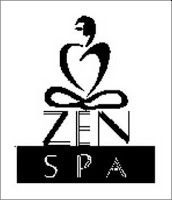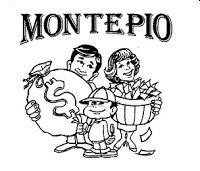The Board dismissed this petition for cancellation of a 2009
registration for the mark ZEN SPA & Design,
shown below, for "Health spa services for health and wellness
of the body and spirit offered at a health resort" [SPA
disclaimed] because the Petitioner Jessica Cosmetics failed to
prove genericness. Petitioner alleged both mere descriptivenes and
genericness but because the challenged registration is more than
five years old, it cannot be attacked on the ground of
descriptiveness. That left genericness, and the Board found that
the mark as a whole is not generic. Jessica Cosmetics International, Inc. v. Zen Spa
Enterprises, Inc., Cancellation No. 92060934 (May 22,
2020) [not precedential] (Opinion by Deputy Chief Judge Mark A.
Thurmon).

Petitioner argued that the term "ZEN SPA" is generic and that the design element of the registration is irrelevant. However, "[p]etitioner gets the cart before the horse," said the Board.
The Board found the design element of the mark to be distinctive. "That is the end of the story."
The only possible basis for cancellation that petitioner advanced is genericness. Because the design elements create a separate commercial impression, petitioner had to show that these elements are generic in order to prevail. However, petitioner did not present any evidence or argument to support such a finding.
The Board observed that petitioner's claim is similar to the claim that the Board dismissed in the Montecash case, which involved the mark shown below.

There the Board found it clear that the word-plus-design mark was not generic as a whole. As here, the petitioner in Montecash asserted only that the word portion of the mark was generic.
And so the Board dismissed the petition for cancellation.
Read comments and post your comment here.
TTABlogger comment: So what does this mean for others who want to use the term "Zen Spa" for health spa services? Should they be concerned about this registration? Or would they be okay if they just avoided using a similar design element?

Petitioner argued that the term "ZEN SPA" is generic and that the design element of the registration is irrelevant. However, "[p]etitioner gets the cart before the horse," said the Board.
The essential question in this case
is not whether the literal element ZEN SPA is generic, but whether
the mark as a whole is distinctive. If the design elements create a
separate, distinctive commercial impression, then the mark is
distinctive regardless of what the literal element means.
Montecash LLC v. Anzar Enters., 95 USPQ2d 1060, 1062-63
(TTAB 2010).
The Board found the design element of the mark to be distinctive. "That is the end of the story."
A finding that the term ZEN SPA is
generic for Respondent's services would result in no relief,
and for that reason, we will not opine on that issue. The only
possible consequence of a finding that ZEN SPA is generic would be
a disclaimer, but that relief was not sought by Petitioner and
would not be available if it had been sought. See
Montecash, 95 USPQ2d at 1065 ("by seeking entry of a
disclaimer for a purportedly generic term that forms part of a mark
that is not generic in its entirety, and that has resided on the
Principal Register for more than five years, [petitioner] has
failed to state a claim upon which the Board will grant
relief.")
The only possible basis for cancellation that petitioner advanced is genericness. Because the design elements create a separate commercial impression, petitioner had to show that these elements are generic in order to prevail. However, petitioner did not present any evidence or argument to support such a finding.
The Board observed that petitioner's claim is similar to the claim that the Board dismissed in the Montecash case, which involved the mark shown below.

There the Board found it clear that the word-plus-design mark was not generic as a whole. As here, the petitioner in Montecash asserted only that the word portion of the mark was generic.
And so the Board dismissed the petition for cancellation.
Read comments and post your comment here.
TTABlogger comment: So what does this mean for others who want to use the term "Zen Spa" for health spa services? Should they be concerned about this registration? Or would they be okay if they just avoided using a similar design element?
The content of this article is intended to provide a general guide to the subject matter. Specialist advice should be sought about your specific circumstances.
